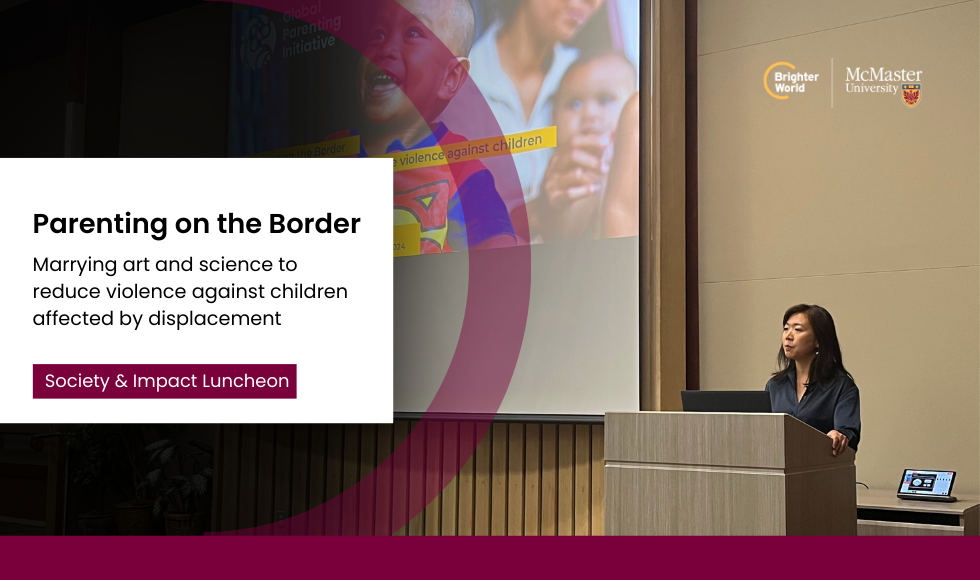Amanda Sim shares research on promoting positive parenting in displaced communities at Society & Impact Luncheon

Through community-engaged research and innovative media interventions, Amanda Sim (Assistant Professor, Psychiatry and Behavioural Neurosciences and core member of Offord Centre for Child Studies and Mary Heersink Global Health Program) explores ways to prevent family violence and promote positive parenting and mental health among refugee and marginalized populations globally.
Research shows that 1 in 2 children worldwide suffer some form of violence each year, with the most common perpetrators of violence being household members, including parents and caregivers.
Sim’s work focuses on finding innovative ways to reduce violence against children and provide education to caregivers – especially those who face barriers to accessing support – on positive parenting practices.
“Violence can have devastating physical and mental health impacts over the course of children’s lives,” says Sim.
“Research has shown that parenting interventions – activities and services aimed at improving parenting knowledge, attitudes and skills – can significantly reduce child maltreatment.”
In partnership with the Global Parenting Initiative, Sim is leading a study on the border of Thailand and Myanmar to evaluate the impacts of an educational film, titled Being Family, on parenting attitudes and behaviours in the region.
“Our approach marries art and science and leverages the power of storytelling to deliver contextually and culturally specific parenting support, with the goal of sparking positive change in the lives of children and families affected by adversity,” she says.
Being Family was co-created by, with, and for migrant and displaced children and families living on the Thailand-Myanmar border. The film follows the lives of two families living on the border and how they navigate the challenges of poverty, insecurity and displacement.
As part of the study, the film was viewed by close to 2000 caregivers and community members. Results from a cluster randomized controlled trial show the film had a significant impact on reducing physical violence against children and improving positive parenting behaviours, parenting knowledge and family functioning among viewers. They also show promising potential to scale-up the film intervention so it can reach more underserved families in low-resource settings.
Sim’s work is a prime example of how academic research can create social change on a global scale, says Sukhvinder Obhi, McMaster’s Associate Vice-President, Research (Society & Impact).
“We were delighted to welcome Dr. Sim to speak about her impactful work at the intersection of health, social change and innovative media approaches in entertainment and education,” he says.
“It’s crucial that McMaster researchers explore avenues to deploy their research skills in ways that produce positive societal change. Sim’s work demonstrates the meaningful impact that community-engaged research can have in populations around the world,” he says.
Interested in viewing the film? McMaster’s Centre for Advanced Research on Mental Health and Society will be hosting Being Family: Film Screening and Panel Discussion on October 9th at the L.R. Wilson Concert Hall. Register for the event.
Visit research.mcmaster.ca and follow us on LinkedIn to find out more about the next Society & Impact Luncheon.
Research Announcements
